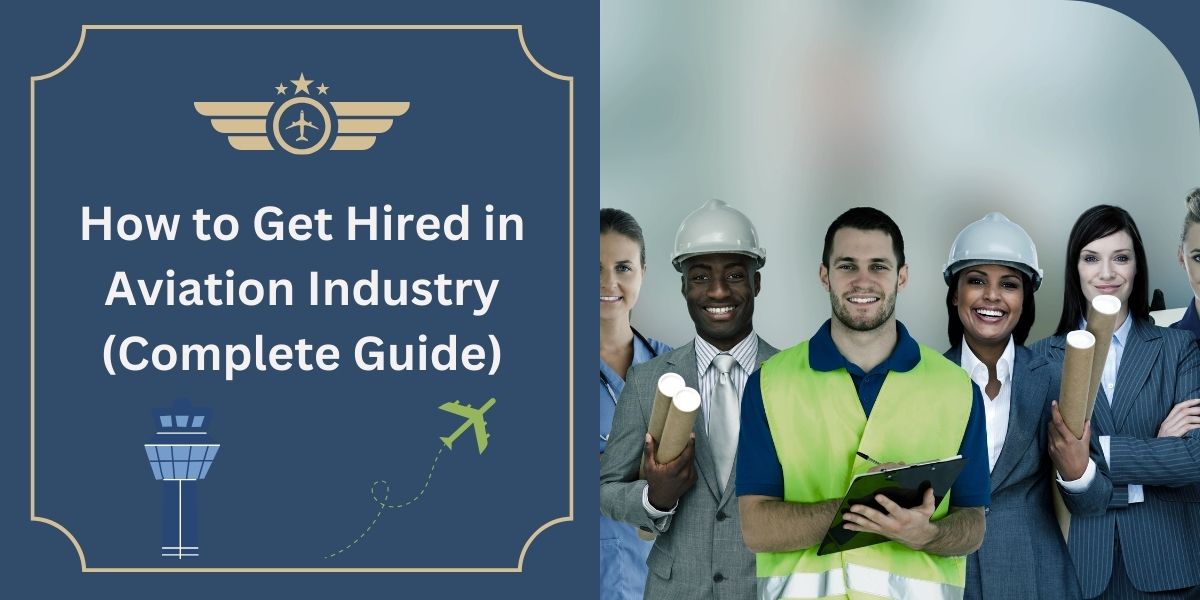In a highly competitive field like the aviation industry, getting hired and securing a job requires a strategic approach that goes beyond traditional job-hunting methods. It is important to optimize your online presence if you want to stand out.
The qualifications to get a job in the airline industry vary depending on the type of work you do. For instance, as an airline pilot, whose responsibilities are to fly an aircraft, you must have a commercial pilot’s license and training, as well as postsecondary education.
In this article, we will discuss the requirements needed to get hired in the aviation industry. Also, we will look into how you can apply for these jobs.
What Are the Requirements to Get Hired in the Aviation Industry?
Let’s look at the three key requirements to get hired in the aviation industry.
1. Get the proper education
There are a huge number of jobs in the airline business, all of which require different education and training. The level of education you’ll need will depend on the position you’re looking for.
Below are some of the common airline jobs and the level of education required.
- Flight attendant. Being a flight attendant typically only requires a high school diploma. If you didn’t finish high school, a GED is also an acceptable level of education.
- Air traffic controller. This job requires either a bachelor’s degree or at least three years of responsible work experience. Any work experience is typically applicable, as long as you can demonstrate that you performed competently. After that, you’ll enter the FAA Academy for education on air traffic control.
- Technicians. There are a variety of technicians who work for airlines, with different specialties. These jobs usually require at least a bachelor’s degree in engineering or a related field and might require further post-graduate work. You’ll also have to pass a certification test to get a job with an airline.
- Pilots. Pilots need extensive education and training. You’ll need at least a bachelor’s degree to be eligible for the job. Of course, you’ll need to know how to fly a plane, so it would help if you already had a pilot’s license before starting college. They will also need to attend an FAA-certified flight school for the proper training to fly commercially.
2. Meet the physical requirements
Some airline jobs have physical requirements. These are to ensure that planes are operated safely. If you want to get hired in the aviation industry, you should meet some of these requirements.
- Vision requirements. Pilots, flight attendants, and air traffic controllers must have 20/20 vision or have corrective eyewear that brings their vision to 20/20.
- Height and weight requirements. Flight attendants typically must be between 5′ 0″ and 6′ 3″, but this varies between airlines. There is no weight requirement, but they must be able to easily walk up and down the aisles of the aircraft.
- Strength requirements. Flight attendants will probably have to lift bags into overhead cabins. As such, some airlines set strength requirements. Being able to lift around 70 pounds is a typical requirement.
- Language requirements. Most airline positions require you to speak and read English proficiently.
- Citizenship. All airline jobs in the US require you to be able to show proof of being able to work in the US.
- Medical requirements. Most airline jobs require you to pass a medical exam to ensure you are healthy enough to perform your job. Pilots typically have to be examined every 6 months to ensure they are capable of operating a plane.
- Age requirements. Most airline jobs will require you to be at least 18. If your job requires you to attend the FAA Academy, you must enroll before you turn 31.
3. Pass a security test.
Like most employers, airlines will conduct a background check on applicants. This will typically be more extensive than a normal background check. Some offenses could cause concern for airlines.
How to Get Hired in The Aviation Industry
Here is a detailed procedure on how to get hired in the aviation industry.
1. Get a Degree in Aviation or a Related Field
Getting a degree in aviation or a related field (such as aviation management or aviation engineering) can be an essential step if you want to get hired in the aviation industry.
Earning a degree in aviation can open up vast opportunities. Allowing one to explore job possibilities such as working at an airport, becoming an airline pilot, becoming part of the military aviation unit, managing fleet operations, running charter services, and many other chosen professions within the aviation industry.
A degree in aviation can also provide you with the perfect preparation for embarking on your journey towards achieving career success.
2. Become Certified to Fly Aircraft
Becoming certified to fly aircraft is essential to advancing your career in aviation. It’s critical to develop the knowledge and skills that meet government-issued regulations as well as the aviation industry’s highest standards.
Look for aviation schools accredited by the Federal Aviation Administration (FAA) for initial training that are approved to offer licenses or certificates. Those certifications assure that you will be functioning safely and confidently in operating aircraft.
Consider doing a combination of ground school and flight instruction to become certified, with the end goal clearly focused on building aviation proficiency over time. With each certificate come more opportunities to further your aviation career.
3. Gain Experience Flying Different Types of Aircraft
Gaining experience flying different types of aircraft is an invaluable asset to getting hired in the aviation industry. Learning how to fly a variety of aircraft with varying sizes and capabilities can give you more chances to land jobs as a pilot or flight instructor.
The more aircraft you can fly, the broader the range of job opportunities that will be available to you. Additionally, as technology continues to advance, staying up-to-date with the latest aircraft and their capabilities will keep you informed on the many changes taking place in the industry.
Your practical experience and knowledge regarding the various planes, engines, systems, and controls will also make you much more attractive to potential employers.
4. Network With Other Aviators and Professionals in the Industry
Networking with other aviators, as well as industry professionals, is a great way to stay informed on the latest developments and career opportunities in the aviation field. It’s important to build relationships that can offer advice and guidance for you to take advantage of as your career progresses.
Attend conferences, seminars, and events that involve industry experts, as well as look for opportunities to join pilot associations and aviation groups. Social media can also be a great tool for connecting with other aviators and staying up-to-date on the latest industry news.
Reaching out to aviation professionals can provide invaluable insight into job openings, career advice, or even mentorship opportunities that may help you reach your career goals. Building strong relationships with aviators and industry professionals is important if you want to get hired in the aviation industry.
5. Stay Up-To-Date on the Latest Aviation News and Trends
It’s essential to stay informed on the latest aviation news, trends, and developments in order to stand out from other aviators.
Reading industry magazines and blogs and attending conferences is an excellent way to expand your knowledge of the industry and see what opportunities may be available.
Additionally, staying up-to-date on new technologies within the aviation industry is important, as the technology and capabilities of aircraft are continuously evolving. You should also be knowledgeable about aviation regulations and how they may affect your career.
Finally, staying current on news related to international air travel can expand your understanding of the aviation industry as a whole and give you the confidence to pursue jobs that may require international experience.
6. Obtain Additional Aviation Certifications
Gaining additional aviation certifications is another great way to increase your chances of success and get hired in the aviation industry.
Certifications such as a commercial pilot license or an aircraft dispatcher certification can open up more job opportunities and allow you to specialize in certain types of aircraft.
In addition, obtaining multiple certifications will demonstrate to potential employers that you are serious about your aviation career and dedicated to learning more about the industry. Obtaining additional certifications is a key step for anyone looking to make a successful career in aviation.
7. Take On Leadership Roles in Your Organization or Community
Taking on leadership roles in your organization or community is a great way to demonstrate your commitment and dedication to the aviation industry.
Leadership roles can come in many forms, from organizing events and workshops, serving as an advocate for aviators, or taking on a mentor role within the field.
Leadership roles will allow you to build relationships with industry professionals and demonstrate your knowledge of the field. Additionally, taking on a leadership role will give you the chance to demonstrate your skills and showcase your capabilities as an aviator.
Moreover, leadership roles can have many benefits, from helping you gain experience in the field to networking with potential employers. By taking on a leadership role, you can become a leader in the aviation industry and maximize your career opportunities.
8. Consider Pursuing a Career as an Aircraft Engineer or Technician
The field of aviation is full of exciting opportunities. From becoming a pilot to working as an aircraft engineer or technician. Pursuing a career as an aircraft engineer or technician can open up new horizons for you. And give you the chance to work with some of the most high-tech and advanced technology in the world.
Working as an aircraft engineer or technician requires a strong technical knowledge base as well as an understanding of aircraft systems and mechanics. Additionally, working in the field will give you the chance to keep up-to-date on new technologies within the aviation industry and gain experience in maintaining and constructing aircraft.
By obtaining certifications related to aircraft engineering or technology, you can give yourself the best chance of success in this field.
9. Develop Strong Communication and Interpersonal Skills
Communication and interpersonal skills are essential for any successful aviator. Developing strong communication and interpersonal skills can help you build relationships with colleagues, clients, and potential employers.
Additionally, these skills can give you the opportunity to demonstrate your knowledge of the aviation industry and prove that you have what it takes to succeed in the field.
By honing your interpersonal and communication skills. You can gain the confidence to speak up in meetings and take on a leadership role within the industry. Additionally, these skills can help you build relationships with potential employers, ensuring that they view you as an asset to their team.
Overall, communication and interpersonal skills are essential for any successful aviator. This is a stepping stone if you want to get hired in the aviation industry.
10. Understand the Complexities of Business Management, Finance and Economics
The field of aviation is a complex and ever-changing industry. And understanding the complexities of business management, finance, and economics can give you an edge over your competitors.
However, taking courses in accounting or economics can help you gain a better understanding of how the industry works and what it takes to succeed.
Additionally, knowing business management and finance can help you develop the skills needed to work with clients and other industry professionals. By taking courses in these areas, you’ll be able to gain the knowledge necessary to succeed in the aviation industry.
11. Research the Different Opportunities Available in the Aviation Industry
The field of aviation is constantly growing and evolving, and researching the different opportunities available in the industry can help you stay on top of the latest developments.
By researching new technologies, innovations, regulations, and industry trends, you’ll also gain a better understanding of how the industry works. Additionally, this research can help you identify potential opportunities for career advancement and increase your chances of getting hired in the aviation industry.
By staying up-to-date on the latest developments in the field, you’ll be able to stay ahead of the competition and take advantage of new opportunities as they arise.
12. Join Professional Organizations Dedicated to the Aviation Industry
Joining professional organizations dedicated to the aviation industry can be a great way to network, learn new skills, and stay on top of the latest developments.
Additionally, these organizations can provide you with opportunities to collaborate with other professionals in your field and gain exposure for your work.
By joining one of these organizations, you’ll be able to connect with potential employers, make valuable contacts, and learn more about the industry.
13. Develop a Passion for the Field and Stay Motivated to Achieve Your Goals
The field of aviation can be challenging and demanding. But having a passion for the industry can help you stay motivated to reach your goals.
By setting short-term and long-term goals, it will be easier for you to stay on track and work towards achieving success in the field.
Additionally, developing a passion for the field can help you stay inspired and motivated during difficult times. By immersing yourself in the industry, it will be easier to maintain a positive attitude and stay focused on achieving your goals.
Conclusion
The aviation industry is constantly evolving. Any aspiring aviator needs to stay up-to-date on the latest developments in the field. In addition to getting certified in relevant areas, networking also plays a pivotal role in getting hired in the aviation industry.
However, you can attend industry conferences, workshops, and seminars to meet professionals from various sectors within aviation.
Establishing meaningful connections can lead to valuable insights, mentorship opportunities, and even job referrals. Leverage social media platforms to engage with aviation communities, share your experiences, and participate in relevant discussions.
By proactively building your online presence and cultivating a strong network, you’ll increase your chances of getting noticed and securing a coveted position in the dynamic and competitive aviation industry.




 Jobi.ng
Jobi.ng



